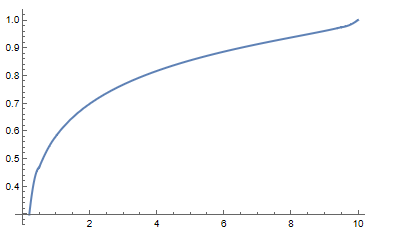With the boundary conditions given in the question, the ODE has no solution, as can be seen as follows. The ODE with constants as specified is
eq = -x*D[h[x], x] + 2*D[((h[x]/(h[x] + 5*(1 - h[x])))*
(1 - 12*x*(1 - h[x])*D[h[x], x])), x] == 0
Solving eq for the second-derivative yields:
Solve[eq, h''[x]] // Simplify // First // First
(* (h''[x] -> -((h'[x] (96 h[x]^3 - 40 h[x] (-3 + x + 6 x h'[x]) +
8 h[x]^2 (-27 + 2 x + 12 x h'[x]) + 5 (-2 + 5 x + 24 x h'[x])))
/(24 x (-1 + h[x]) h[x] (-5 + 4 h[x]))) *)
Thus, the ODE is singular not only at x = 0 but also at h[x] equal to any of {0, 1, 5/4}, for any x; i.e., at both boundaries. To understand this behavior better, let us attempt to expand h[x] at x = 0.
Thread[(CoefficientList[Normal@Series[eq, {x, 0, 1}], x] // Simplify) == 0]
(* ((2 (5 - 60 h[0] + 108 h[0]^2 - 48 h[0]^3) h'[0])/((5 - 4 h[0])^2)) == 0,
-(1/((-5 + 4 h[0])^3))((-5 + 4 h[0])^3 h'[0] +
32 (-35 + 105 h[0] - 90 h[0]^2 + 24 h[0]^3) h'[0]^2 +
2 (25 - 620 h[0] + 1560 h[0]^2 - 1344 h[0]^3 + 384 h[0]^4) h''[0]) == 0 *)
If h[0] == 0, then the first equation yields h'[0] == 0 and the second equation yields h''[0] == 0. Higher order expansions indicate that all derivatives of h{x] must vanish, which cannot be. So, no series expansion exists at x = 0 for h[0] = 0. On this basis, it seems likely that the ODE cannot be solved numerically for the specified boundary conditions. On the other hand, from the first equation of the series expansion,
2 (5 - 60 h[0] + 108 h[0]^2 - 48 h[0]^3) == 0
allows h'[0] to assume any value!
SolveValues[%, h[0]] // N
(* {0.100805, 0.72616, 1.42304} *)
In other words, if h[0] is equal to any these three values, a series solution can be constructed at x = 0, and h[x] then solved numerically in the vicinity. Even then, it seems unlikely that any h[10] boundary condition could be satisfied simultaneously.
The numerical solution obtained by Daniel Huber employes the Finite Element method. Ordinarily, this approach works well. Here, however, the ODE is so singular that it apparently does not.

